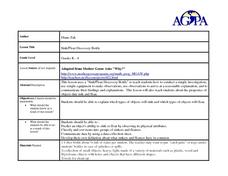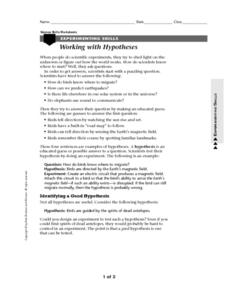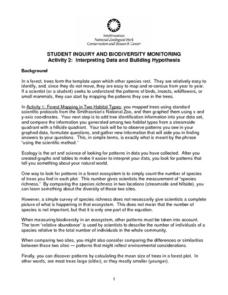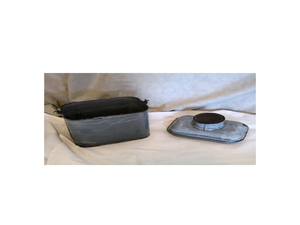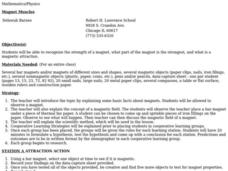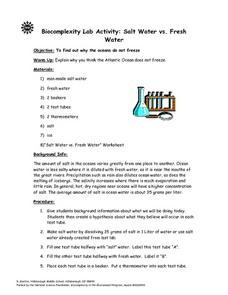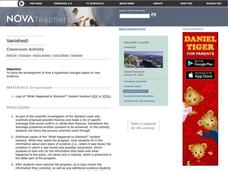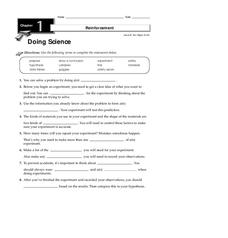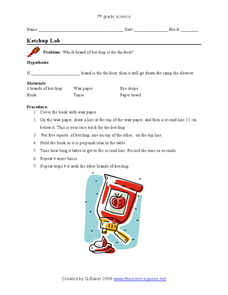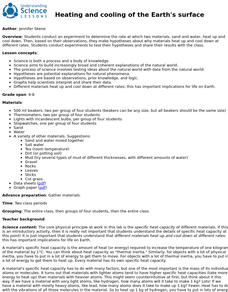Curated OER
Plants, Ecology, Seed Planting
First graders use senses to examine objective or events, then gather and interpret data with instruments. They design invention to support or refute hypothesis, then generate, record, and organize data. They improve environmental...
Curated OER
Sink/Float Discovery bottle
Investigate which items float and which ones sink using this resource. Learners participate in an activity in which they investigate this phenomena. Then they describe the experimental process, and learn how to display their results.
Curated OER
Working With Hypotheses
In this science worksheet, students examine the topic in order to solidify knowledge covered in the curriculum using puzzles and creative games.
Curated OER
Interpreting Data and Building Hypothesis
Students define the term species, and graph species data together with previously collected data at the National Zoo. They interpret graphed data and recognize patterns in the streamside quadrant versus hillside quadrant. Students use...
Curated OER
Springs
Springs are amazing. Here, learners are presented with springs found in various everyday objects. They discuss which springs they think will have the most force, then test their hypothesis. This presentation has the start of a good idea...
Curated OER
Lunch Pail
Explore a 1900s lunch pail. In this oral language and 1900s history instructional activity, students view a photograph of an old-fashioned lunch pail. Students describe the object and make predictions about what it is and its possible...
Curated OER
The Egg Activity
Students comprehend the three basic steps of science: 1) Observation, 2) Statements of cause and effect (Hypotheses), and 3) Testing. By working with an egg, students are required to observe an object that is very common to them. This...
Curated OER
Types of Marine Debris
Young scholars conduct an experiment. In this marine debris and environment protection lesson, students categorize trash into piles, predict whether these trash items will sink, float or be picked up and carried by the wind and then...
Curated OER
BRIDGING THE GENERATION GAP
Students create a hypothesis about the attitudinal differences between generations, test their hypothesis with a survey, chart their findings, and present their answers to the class.
Curated OER
Burning It Up
Students explore energy as it relates to body function. Data about the personal physical activity of students is gathered and entered into a database which is utilized to test hypotheses made.
Curated OER
Magnet Muscles
Students experiment with magnetism. In this science lesson plan, students are divided into cooperative learning groups and use the scientific method to test their hypothesis. Each group performs a different experiment.
Curated OER
Salt Water vs. Fresh Water
Students explore why the oceans do not freeze. They explain why they think the Atlantic Ocean does not freeze. Students are given background information about what they are doing. They create a hypothesis about what they believe...
Curated OER
The Scientific Method
In this scientific method worksheet, students read over the basic steps of the scientific method and then apply those steps to a specific example. This worksheet has 8 short answer questions.
Curated OER
Vanished!
Students view a video clip about the Stardust crash site. They discover how hypothesis change based on new evidence. They research unsolved plane crashes as well.
Curated OER
Doing Science
In this science experiment process worksheet, students will learn about the steps of conducting a science experiment, including creating a hypothesis, collecting data and drawing a conclusion. This worksheet has 8 fill in the blank...
Curated OER
Ketchup Lab
In this ketchup worksheet, students investigate the thickness of different types of ketchup. They hypothesize, identify their independent and dependent variables, test their hypothesis and write conclusions based on their data.
Curated OER
Scientific Method Study Guide
In this scientific method worksheet, students answer questions about the various steps of the scientific method. They distinguish between the variables in an experiment and between a hypothesis and a theory.
Curated OER
Estimation and Your TV Diet
Students develop estimation skills by using real life situations. In this estimation lesson students collect data about their television watching habits. They make hypothesis about the number of hours they watch, how many commercials,...
Curated OER
Primes and Prime Factors
For this primes and prime factors worksheet, 8th graders solve 21 different problems to include identifying each number as prime, composite, or neither prime nor composite and listing all the primes less than 200. Then they complete each...
Alabama Learning Exchange
Plants, Soil and Nutrients
Young scholars conduct an experiment. They review how to use the scientific method to conduct an experiment with white carnations and food coloring. They create a hypothesis and test it to better understand how plants get nutrients,...
Curated OER
The Human Organism
In this digestion and nutrition lesson, 3rd graders test foods to find their vitamin content. Students test for starch and fats then compare their findings on charts and oral reports. The lesson concludes with a teacher directed class...
University of California
Heating and Cooling of the Earth's Surface
Scholars collect data from heating sand and water before forming testable hypotheses about why sand heats up faster. Afterward, they develop and run experiments to test their hypotheses.
Mr. Science
The Scientific Method
First, ask a question and then, do research. Next, form a hypothesis, and conduct an experiment. Make observations, gather and analyze data, and then state a conclusion based on the results. This is the scientific method, and here is a...
American Statistical Association
Don't Spill the Beans!
Become a bean counter. Pupils use a fun activity to design and execute an experiment to determine whether they can grab more beans with their dominant hand or non-dominant hand. They use the class data to create scatter plots and then...



